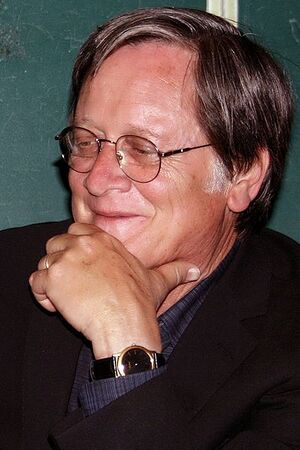Tim Powers (nonfiction): Difference between revisions
No edit summary |
No edit summary |
||
| Line 1: | Line 1: | ||
[[File:Tim_Powers_2012.jpg|thumb|Tim Powers (2012).]]'''Timothy Thomas "Tim" Powers''' (born February 29, 1952) is an American science fiction and fantasy writer. | [[File:Tim_Powers_2012.jpg|thumb|Tim Powers (2012).]]'''Timothy Thomas "Tim" Powers''' (born February 29, 1952) is an American science fiction and fantasy writer. | ||
Powers has won the World Fantasy Award twice for his critically acclaimed novels ''Last Call'' and ''Declare''. | Powers has won the World Fantasy Award twice for his critically acclaimed novels ''Last Call'' and ''Declare''. | ||
| Line 9: | Line 7: | ||
Most of Powers' novels are "secret histories": he uses actual, documented historical events featuring famous people, but shows another view of them in which occult or supernatural factors heavily influence the motivations and actions of the characters. | Most of Powers' novels are "secret histories": he uses actual, documented historical events featuring famous people, but shows another view of them in which occult or supernatural factors heavily influence the motivations and actions of the characters. | ||
Typically, Powers strictly adheres to established historical facts. He reads extensively on a given subject, and the plot develops as he notes inconsistencies, gaps and curious data | Typically, Powers strictly adheres to established historical facts. He reads extensively on a given subject, and the plot develops as he notes inconsistencies, gaps and curious data. | ||
Regarding his 2000 novel ''Declare'', he stated: | Regarding his 2000 novel ''Declare'', he stated: | ||
| Line 21: | Line 13: | ||
<blockquote>I made it an ironclad rule that I could not change or disregard any of the recorded facts, nor rearrange any days of the calendar – and then I tried to figure out what momentous but unrecorded fact could explain them all.</blockquote> | <blockquote>I made it an ironclad rule that I could not change or disregard any of the recorded facts, nor rearrange any days of the calendar – and then I tried to figure out what momentous but unrecorded fact could explain them all.</blockquote> | ||
On writing style, Powers says: | |||
<blockquote> | <blockquote> | ||
All that can make any writer’s work unique is the writer’s personal perspective, and that’s the result of ... what? What he finds interesting, I guess, what he figures is worth paying attention to, and what conclusions he’s come to about things. | |||
I’m a conservative Catholic who’s also fascinated with stuff that’s grotesque and weird and funny and dramatic. | I’m a conservative Catholic who’s also fascinated with stuff that’s grotesque and weird and funny and dramatic. | ||
| Line 32: | Line 24: | ||
Add all that up, together with having quit drink twelve years ago, and you get Powers. | Add all that up, together with having quit drink twelve years ago, and you get Powers. | ||
</blockquote> | </blockquote> | ||
== In the News == | |||
<gallery> | |||
</gallery> | |||
== Fiction cross-reference == | == Fiction cross-reference == | ||
| Line 40: | Line 37: | ||
== Nonfiction cross-reference == | == Nonfiction cross-reference == | ||
External links: | |||
* [https://en.wikipedia.org/wiki/Tim_Powers Tim Powers] @ Wikipedia | * [https://en.wikipedia.org/wiki/Tim_Powers Tim Powers] @ Wikipedia | ||
Latest revision as of 17:08, 3 July 2017
Timothy Thomas "Tim" Powers (born February 29, 1952) is an American science fiction and fantasy writer.
Powers has won the World Fantasy Award twice for his critically acclaimed novels Last Call and Declare.
His 1988 novel On Stranger Tides served as inspiration for the Monkey Island franchise of video games and was optioned for adaptation into the fourth Pirates of the Caribbean film.
Most of Powers' novels are "secret histories": he uses actual, documented historical events featuring famous people, but shows another view of them in which occult or supernatural factors heavily influence the motivations and actions of the characters.
Typically, Powers strictly adheres to established historical facts. He reads extensively on a given subject, and the plot develops as he notes inconsistencies, gaps and curious data.
Regarding his 2000 novel Declare, he stated:
I made it an ironclad rule that I could not change or disregard any of the recorded facts, nor rearrange any days of the calendar – and then I tried to figure out what momentous but unrecorded fact could explain them all.
On writing style, Powers says:
All that can make any writer’s work unique is the writer’s personal perspective, and that’s the result of ... what? What he finds interesting, I guess, what he figures is worth paying attention to, and what conclusions he’s come to about things.
I’m a conservative Catholic who’s also fascinated with stuff that’s grotesque and weird and funny and dramatic.
On an almost cellular level I find writers like Chesterton and Lewis convincing – and, being Irish, I’ve been a big fan of alcohol and poetry: Laphroaig scotch, Wild Turkey bourbon, Byron, Swinburne, Housman, Eliot, Auden!
Add all that up, together with having quit drink twelve years ago, and you get Powers.
In the News
Fiction cross-reference
Nonfiction cross-reference
External links:
- Tim Powers @ Wikipedia
- The Powers of Fantastic Fiction: Interview with Tim Powers @ IgnatiusInsight.com - September 7, 2005
- Medusa's Web: Tim Powers is the Philip K Dick of our age @ Boing Boing
- See also Philip K. Dick (nonfiction)
